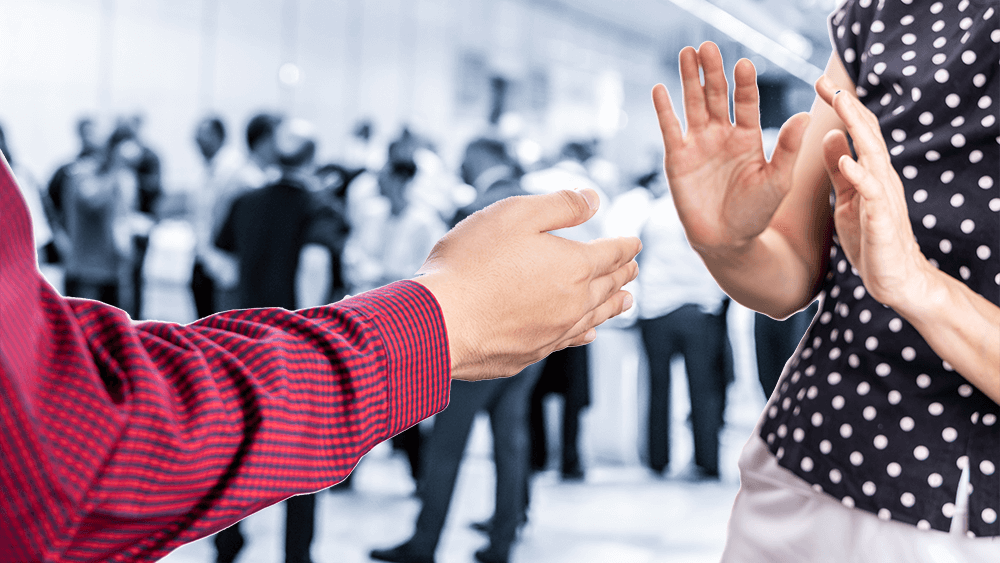
Navigating social norms, like whether to shake hands or to elbow bump colleagues and friends, are likely to cause anxiety when people meet face to face again.
Sara Ross, founder of the BrainAMPED research group, noticed something unexpected the morning when her husband left their home, where they’d both been working for months, to go to his office for the first time since the pandemic. She felt, not exactly anxiety, she recalled, but a kind of emptiness. It reminded Ross, a leadership strategist whose work is grounded in neuroscience, that as we start traveling and meeting again in person, our emotions — and those of others — may surprise us.
“As we’re circling back into the world, there are two pieces,” Ross — a 2019 PCMA EduCon Main Stage speaker — told Convene. There’s “managing some of the inevitable anxiety and discomfort that comes from not knowing exactly what we are going back into,” as well as the emotions that people may have about disrupting the new routines that the pandemic created — and coming to terms with loss.

Sara Ross
People’s individual experiences have varied, she said, “but I don’t know if there’s anyone who hasn’t felt an element of loss — either of lost time, or lost lives, or the loss of life experiences, or of competence, or safety, or momentum, or roles.” Last year, when everything stopped and people couldn’t be together, we entered the COVID-19 pandemic in a global “culture-shock way,” she said. “But going back to it, it’s going to be gradual. And I think we’re going to have to have patience and empathy with ourselves and with the people around us.”
When it comes to in-person conferences, event organizers can expect almost everybody to feel some hesitancy and anxiety about meeting again, Ross said. She described three different kinds of anxiety organizers and participants might encounter, including anticipatory anxiety — which is our brain’s natural inclination toward negative bias. “We tend to think,” Ross said, “that things are going to much more uncomfortable or more challenging than they turn out to be.”
Some people are also likely to be anxious about their physical safety and worry about things like how well surfaces are cleaned, she said. But the anxiety that Ross expects will have the biggest impact is about social norms, around everything from what to wear after more than a year at home, to whether to hug or elbow bump colleagues and friends when you meet again. “These things seem small, but they are the kinds of things that are taking up mental real estate, with people worrying about how they will fit in,” Ross said. “People are asking themselves: ‘How do I connect in a way that’s appropriate? And what do I do if someone does something that, from my perspective, is not appropriate?’”
Organizers can help meeting participants manage their anxiety simply by being aware and accounting for it as they design the attendee’s experience, Ross said. “If you think you’re going to have to answer a question a hundred times, expect to answer it 500 times, because when people are nervous, they look for information, even if it’s right there for the taking. That’s where patience comes in and giving more time for everything.”
The need for social connection is a fundamental human need, whether you are an introvert or extrovert, Ross said. But post-pandemic, “even extroverts, who are super excited to get back to live events,” may find that their energy gets used up more quickly than before, Ross said. “There is a social stamina that people will need to work back up to. I suspect that even seasoned travelers will find travel more tiring. People may need more time to replenish that energy. I think we all need to give ourselves a little more time, a little more space, and little more grace to enjoy the full benefits of being back live with people at events.
“Meeting organizers might consider giving more frequent, but perhaps shorter periods of time for people to truly reconnect. This helps people manage their energy and build up their stamina, but it also allows people the extra space and time to truly share their experiences of the last year and half. Nothing will overcome anxiety faster then a genuine connection with another person.”
It’s okay to address the topic of anxiety directly, she said. During the pandemic, “conversations have opened up and shifted around mental health, including around the need people have to recognize that emotions have been at their peak and that has been a worldwide experience,” Ross said. As you’re giving more space and time for people, “you could even start offering opportunities to participate in mindfulness-based breath practices and stretching — things that help you “emotionally be present,” Ross said. “I think some of those things would be very, very valuable to start building into the structure of meetings.”
There also may be norms that are going to need to be reset, including around the use of technology, Ross added. “I worry about people going back to live events and, if you’re somewhere where there are precautions around social distancing, there will be four people sitting at a table all together for the first time — all with their heads down in their phones as an escape mechanism to avoid discomfort.” It matters, Ross said, because “when we’re sitting with somebody who picks up their phone while we’re talking to them, we process that as rejection. And we process rejection in the same part of our brain that we process pain — it actually hurts us, adding more disconnection at a time when reconnecting is so important.”
Meeting organizers can suggest people be mindful of their devices so they can be present in a low-key, comfortable way, Ross said, “but I think you need to raise awareness because there are people who will be picking up their phone and not even realizing it, simply because they are out of practice in being in groups.” (Recognizing the increasing influence technology was having in our everyday lives, especially during the pandemic, prompted Ross to design an online tool to help people understand their digital habits and assess their impact.)
When We Don’t Know What’s Good for Us
Our first impulse when we are anxious or feel uncomfortable may be to retreat, but “we’re not very good at knowing what is good for us,” said Ross, who conducts research into vitality. There is a 10-year-old study “based on the idea that we think we know what we want and need in order to be happy,” Ross said. “But the science shows us that we’re actually incredibly bad at predicting what will make us feel happy. And this shows up in a million ways.” When people are feeling tired, for example, “they think the best way to feel less tired is to step back and slow down and put new boundaries in place.” Elements of that are important, “but we think that we need to just stop things,” Ross said. “And in fact, usually we need to reconnect in other areas of our life. That’s what’s most fulfilling to us from an energy perspective.”
Our brains think that we like comfort, Ross said, but we’re at our best when we are reconnecting with people and socializing and learning and exploring — the kinds of things we do at meetings. “And the only way for us to do that is to take these small steps and gradually start getting back out in the world again and talking to people and recognize that everybody feels a little uncomfortable. It’s okay to say: ‘I’m not even sure how to have small talk anymore.’ I guarantee that 90 percent of the people standing near you will laugh. We’ll agree — and then it won’t be uncomfortable anymore. Keep an open heart and an open mind. Ask questions, and then be present and listen to people and appreciate that there have been different experiences — the rest will come naturally
“I think meeting planners are in this beautiful spot, because they already know how to make meetings amazing,” Ross said. “I think the challenge is going to be overcoming some of that hesitancy that people have, while reminding them of what makes them feel human and alive.”
Paying attention to the nuances of connection creates an opportunity for the events industry, Ross said. Social connection one of our most basic human needs, she said. “I think [the meeting industry] is the industry that can help get us to a new normal that is psychologically, socially, and physically healthy for people.” Just appreciate that people are going to need to get back into the world on their own terms, Ross said.
Barbara Palmer is deputy editor of Convene.
